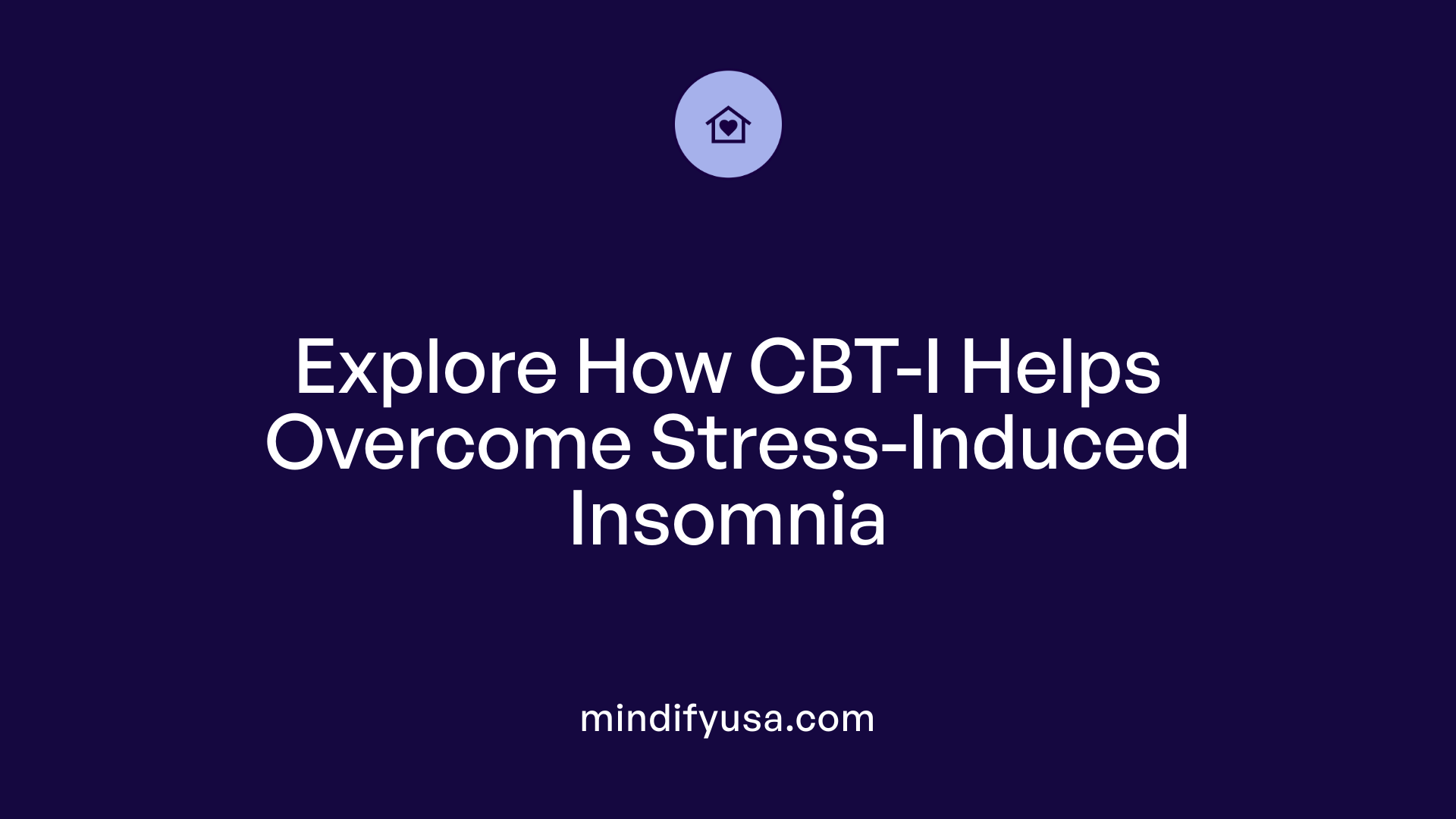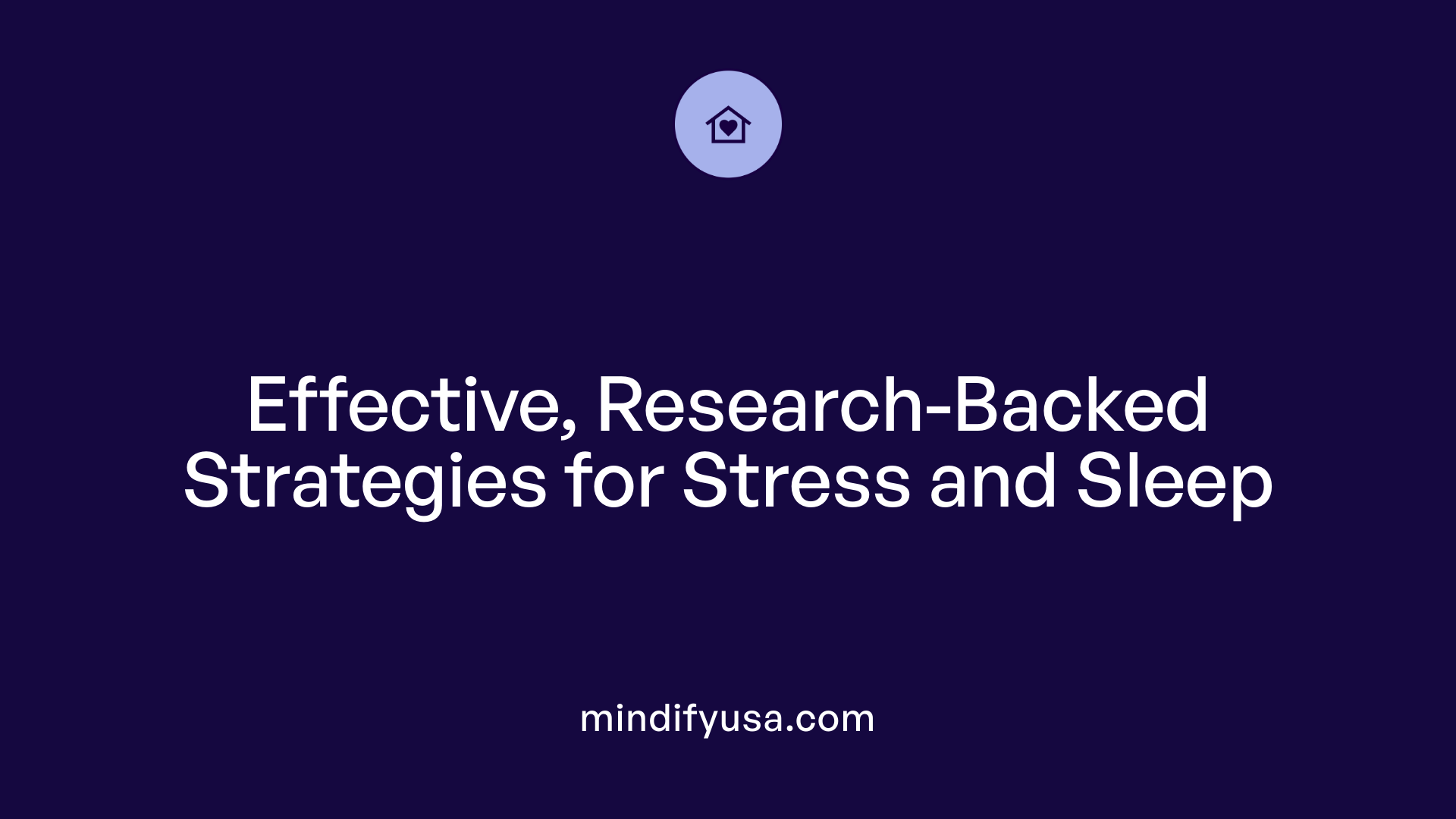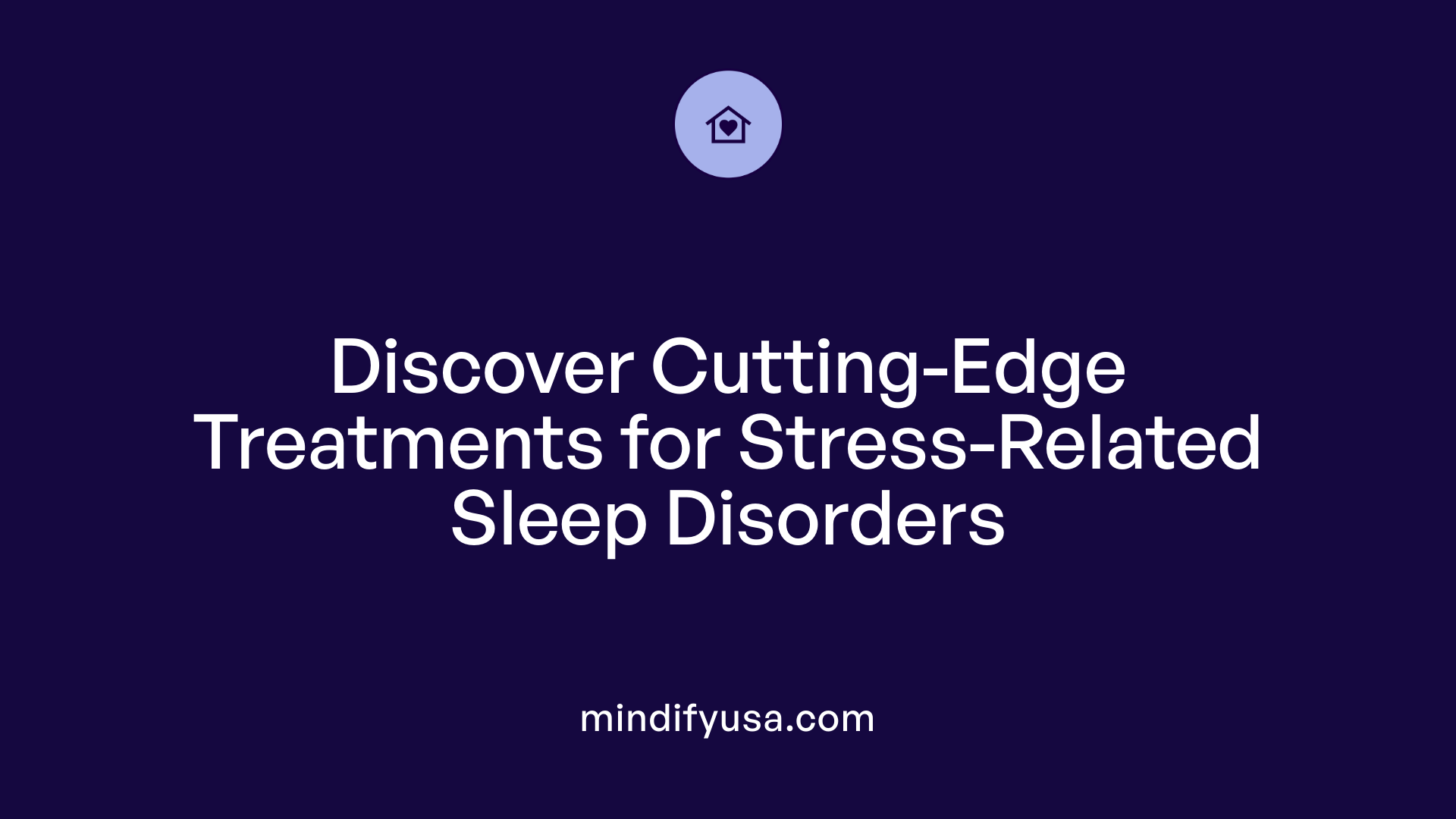Understanding Stress-Induced Insomnia and Its Treatment Options
Stress-induced insomnia is a common sleep disorder characterized by difficulty falling asleep, frequent awakenings, or poor sleep quality caused by psychological and physiological stressors. It can significantly impair mental health, mood, and overall well-being. This article explores how therapy, especially cognitive-behavioral therapy for insomnia (CBT-I), sleep hygiene practices, relaxation techniques, and innovative approaches, can effectively address stress-related sleep issues, fostering better sleep and improved mental health.
The Link Between Stress and Insomnia
How can understanding the causes and symptoms of stress-induced insomnia aid in its management?
Understanding the causes and symptoms of stress-induced insomnia is fundamental for effective management. When individuals recognize that high stress levels trigger their sleep difficulties, they can take targeted steps to address both the stress and the sleep issues.
Stress activates the body's fight-or-flight response, leading to the release of stress hormones like cortisol and adrenaline. These hormones, although essential for alertness during stressful situations, can interfere with sleep when elevated at bedtime. High cortisol levels keep the brain and body in a state of hyperarousal, making it difficult to fall asleep or stay asleep.
Symptoms of stress-related insomnia include trouble falling asleep, waking frequently during the night, feeling restless or anxious before bed, waking too early, and experiencing daytime fatigue. Being aware of these symptoms helps distinguish stress-induced insomnia from other sleep disorders.
Recognizing these symptoms means individuals can implement specific strategies, such as relaxation techniques, lifestyle adjustments, and cognitive-behavioral therapy (CBT). For example, practices like deep breathing exercises, progressive muscle relaxation, and mindfulness meditation can calm the nervous system.
Furthermore, addressing stressors—whether related to workload, relationships, or life changes—can reduce the physiological arousal that impairs sleep. Lifestyle modifications, including establishing a consistent bedtime routine, avoiding stimulants like caffeine, and creating a sleep-conducive environment, can reinforce sleep hygiene.
Therapeutic approaches like CBT for insomnia help reframe unhelpful thoughts surrounding sleep and reduce anxiety. Journaling or engaging in calming activities before bed can diminish rumination and racing thoughts.
In summary, understanding the causes and recognizing the symptoms of stress-induced insomnia empower individuals to take proactive measures. Early identification allows for tailored interventions that break the cycle of stress and sleep disturbance, leading to improved health, mood, and productivity.
Additional Strategies to Address Stress-Related Sleep Problems
To further aid management, integrating activities such as gentle yoga, tai chi, or listening to calming sounds can soothe the nervous system. Maintaining regular physical activity during the day, managing exposure to stress-inducing news or social media before bedtime, and seeking support from mental health professionals when necessary enhance long-term sleep health.
The comprehensive approach combining stress management, behavioral modifications, and sleep hygiene education underlines the importance of tackling both the mental and physical aspects of stress-induced insomnia. Such strategies, when consistently applied, help restore natural sleep patterns and improve overall well-being.
Effective Interventions and Their Impact
Research supports that behavioral therapies, especially CBT, significantly decrease sleep latency and night awakenings by addressing the root causes of stress-related arousal. These interventions have demonstrated durability, with benefits persisting months after treatment.
In conclusion, understanding the intricate relationship between stress and insomnia facilitates early detection and personalized treatment. Managing stress effectively not only improves sleep but also enhances mental health and resilience, creating a positive cycle of well-being and restful sleep.
Recognizing Symptoms and Causes of Stress-Induced Insomnia
How can understanding the causes and symptoms of stress-induced insomnia aid in its management?
Understanding what triggers and manifests stress-related insomnia is vital for effective intervention. Stress-induced insomnia commonly presents with difficulty falling asleep, frequent awakenings during the night, and waking up too early in the morning. Recognizing these symptoms early allows individuals to distinguish stress-related sleep issues from other disorders and seek appropriate treatment.
The root causes often involve chronic stress from work, relationships, financial concerns, or other significant life changes. Elevated stress hormones, such as cortisol and adrenaline, keep the nervous system activated, making relaxation and sleep difficult. This hyperarousal state leads to the classic insomnia symptoms and can worsen mental health, causing irritability, anxiety, depressed mood, and fatigue.
By understanding these symptoms and causes, individuals and healthcare providers can tailor management strategies more effectively. These may include stress reduction techniques like deep breathing exercises, progressive muscle relaxation, mindfulness meditation, and cognitive-behavioral therapy (CBT). Lifestyle adjustments such as establishing a calming bedtime routine, improving sleep hygiene, and managing daily stressors are also crucial.
Addressing the underlying factors—whether psychological, behavioral, or physiological—breaks the cycle of stress and sleeplessness. For example, therapy sessions can help reframe negative thoughts and develop coping skills, while lifestyle modifications can decrease overall stress levels.
In addition, avoiding stimulants like caffeine and alcohol, limiting exposure to stressful content before bedtime, and creating a sleep-friendly environment support better sleep. When treatment targets both stress management and behavioral changes, the prognosis improves significantly.
Ultimately, understanding the specific symptoms and their underlying stressors empowers individuals to implement timely and appropriate interventions, leading to improved sleep quality, enhanced daytime functioning, and overall well-being.
| Symptoms of Stress-Induced Insomnia | Common Causes | Potential Management Strategies |
|---|---|---|
| Difficulty initiating sleep | Work-related stress | Relaxation techniques (breathing, meditation) |
| Frequent night awakenings | Relationship challenges | Cognitive-behavioral therapy (CBT) |
| Early morning awakening | Major life changes | Sleep hygiene improvements |
| Irritability and fatigue | Anxiety and worry | Lifestyle modifications (exercise, diet) |
| Worsening mental health | Chronic stress | Journaling and stress management |
Addressing both symptoms and causes comprehensively supports long-term sleep health and mental resilience.
Self-Care Strategies to Improve Sleep During Stressful Periods
What are some self-care tips to improve sleep when experiencing stress?
Managing stress-induced sleep difficulties requires a combination of behavioral practices and relaxation techniques. Establishing a consistent sleep schedule is fundamental. Going to bed at the same time each night and waking up at the same time daily helps regulate your body's internal clock, making it easier to fall asleep and wake refreshed.
Creating a calming bedtime routine also significantly improves sleep quality. Engaging in relaxing activities such as deep breathing exercises, mindfulness meditation, or gentle stretches can help calm an overactive mind and relax tense muscles. These activities activate the body's relaxation response, resulting in lowered heart rate and reduced secretion of stress hormones like cortisol.
Avoiding stimulants before bed is crucial. Caffeine, nicotine, and heavy or spicy meals can trigger alertness and cause difficulty falling asleep. It’s advisable to have your last caffeine intake in the early afternoon and avoid nicotine and large meals at least two hours before bedtime.
Enhancing your sleep environment can further promote restfulness. Using tools such as weighted blankets can provide comforting pressure that helps reduce anxiety. Engaging in mindfulness practices, like guided imagery or sensory focusing, can shift attention away from worries and foster a sense of tranquility.
If stress and sleep issues persist despite these efforts, cognitive behavioral therapy for insomnia (CBT-I) offers a proven approach to modify unhelpful thoughts about sleep, reduce nighttime worries, and establish healthier sleep habits. Professional guidance from therapists, whether in person or online, can tailor interventions to individual needs.
In summary, combining a regular sleep schedule, relaxing pre-bed routines, stimulating avoidance, and possibly trauma-informed therapy can significantly alleviate stress-related sleep disturbances, leading to healthier, restorative sleep even during stressful times.
Effective Strategies for Managing Stress-Related Insomnia
What are effective strategies for managing stress-induced insomnia?
Managing stress-induced insomnia involves a comprehensive approach that targets both the mental and physical states that hinder sleep. One of the most effective methods is practicing relaxation techniques. Deep breathing exercises, progressive muscle relaxation, and meditation are particularly beneficial. These techniques help activate the body's relaxation response, reducing levels of stress hormones such as cortisol and adrenaline, which are often elevated in individuals experiencing anxiety and poor sleep.
Creating a sleep-friendly environment also plays a crucial role. Ensuring the bedroom is cool, dark, and quiet can significantly improve sleep quality. Using blackout curtains, lowering the temperature, and eliminating noise disturbances help facilitate a natural transition into sleep. Establishing a consistent sleep schedule—going to bed and waking up at the same times daily—helps regulate the body's internal clock and reinforces healthy sleep patterns.
Avoiding activities that increase alertness before bedtime is essential. Checking the clock repeatedly or using electronic devices like smartphones or laptops can heighten anxiety about sleep and delay sleep onset. Instead, engaging in quiet, non-stressful activities outside of the bed, such as reading a book or listening to calming music, can prevent learned wakefulness and promote relaxation.
In addition to these strategies, cognitive-behavioral therapy for insomnia (CBT-I) offers a structured, evidence-based approach to addressing long-term stress and behavioral factors. It helps reframe unhelpful thoughts about sleep, establish healthy habits, and develop coping skills to manage stress effectively.
Together, these strategies—combining relaxation techniques, environmental adjustments, behavioral changes, and professional support—form a robust plan for overcoming stress-induced insomnia and restoring restful nights.
Understanding How CBT-I Combats Stress-Related Sleep Problems

How does cognitive-behavioral therapy for insomnia (CBT-I) work and how can it help with stress-related sleep problems?
Cognitive-behavioral therapy for insomnia (CBT-I) is a highly effective, structured treatment that targets the thoughts and behaviors contributing to difficulty sleeping. Stress often triggers feelings of worry and tension, which can escalate sleep difficulties. CBT-I addresses these issues by helping individuals recognize and modify patterns that interfere with sleep.
The therapy involves a variety of techniques designed to promote restful sleep and reduce the anxiety surrounding sleep problems. It begins with identifying unhelpful beliefs about sleep, such as the fear of not sleeping or unrealistic expectations about rest. Through cognitive restructuring, individuals learn to challenge and replace these negative thoughts with more realistic and calming beliefs.
In addition to addressing thoughts, CBT-I focuses on behavioral interventions that directly influence sleep habits. Key among these are stimulus control and sleep restriction.
Stimulus control involves associating the bedroom environment strictly with sleep and intimacy. Patients are encouraged to use the bed only for sleep and sex, and to get out of bed if unable to fall asleep within 10-15 minutes, returning only when feeling sleepy. This helps weaken the learned association between the bed and wakefulness.
Sleep restriction limits the amount of time spent in bed to match actual sleep duration, as recorded in sleep diaries. By doing so, it increases sleep drive and consolidates sleep, making sleep more efficient. Over time, this approach reduces the frustration of prolonged wakefulness.
Relaxation training, another core element, helps calm the nervous system, lowering arousal levels that often prevent sleep. Techniques such as deep breathing exercises, progressive muscle relaxation, autogenic training, and mindfulness meditation are taught to promote physical and mental relaxation.
Since stress elevates cortisol and adrenaline, which hinder sleep, these relaxation methods can diminish stress hormone levels, slow the heart rate, and prepare the body for restful sleep.
Most individuals undergoing CBT-I participate in 6 to 8 weekly sessions. During this period, psychoeducation about sleep hygiene, relaxation techniques, and behavioral strategies are discussed and practiced. As a result, many patients experience improved sleep quality, reduced sleep anxiety, and better overall mental well-being.
One case illustrating its effectiveness is JL, who successfully reduced her sleep problems and dependency on sleep medications by following CBT-I principles, notably through implementing stimulus control and relaxation exercises.
In summary, CBT-I not only helps individuals establish healthier sleep habits but also reduces their stress and anxiety related to sleep failure. By restructuring thoughts and modifying behaviors, it addresses the root causes of stress-induced insomnia, providing long-lasting relief without the side effects associated with pharmaceutical treatments.
Evidence-Based Interventions for Stress-Related Sleep Issues

Are there effective, evidence-based interventions for stress-related sleep issues?
Yes, there are several well-supported treatment options for managing sleep problems caused by stress. Among them, cognitive-behavioral therapy for insomnia (CBT-I) stands out as the most effective, evidence-based approach. Recognized as a first-line treatment in clinical guidelines, CBT-I targets the thoughts, behaviors, and habits that perpetuate insomnia.
CBT-I involves diverse components such as sleep restriction, stimulus control, cognitive restructuring, and sleep hygiene education. It aims to decrease conditioned arousal—the mental and physical activation preventing sleep—and supports natural sleep mechanisms. This therapy has demonstrated long-lasting benefits, with many patients experiencing significant improvements even months after completing treatment.
Relaxation techniques are another cornerstone in stress management and sleep improvement. Techniques like progressive muscle relaxation, deep belly breathing, and biofeedback help lower levels of stress hormones like cortisol and adrenaline. Although biofeedback is promising, current guidelines do not recommend it as a standalone treatment yet. These practices work by calming the nervous system and promoting a relaxation response that facilitates sleep.
Mindfulness-based practices have also gained attention in this context. Mindfulness Meditation and Mindfulness-Based Stress Reduction (MBSR) teach individuals to observe their thoughts and feelings non-judgmentally, reducing rumination and mental chatter that interfere with sleep. Studies involving medical populations, such as cancer patients, indicate significant reductions in sleep disturbances and anxiety following these interventions.
In addition to therapy and relaxation techniques, lifestyle modifications—such as establishing a consistent sleep schedule, creating a sleep-friendly environment, avoiding stimulants before bedtime, engaging in regular physical activity, and managing daily stress—contribute to better sleep outcomes. While medication or supplements can be useful, especially in acute cases, they are generally recommended as adjuncts rather than primary solutions for stress-related insomnia.
Emerging treatments are under investigation, including neurostimulation techniques and trauma-focused therapies for specific populations. These show promise but require further validation.
Summarizing, the most robust evidence supports CBT-I and relaxation practices as front-line, non-pharmacological options. These interventions not only improve sleep but also help reduce stress and anxiety, fostering overall mental health.
| Treatment Approach | Effectiveness Level | Notes |
|---|---|---|
| Cognitive-behavioral therapy for insomnia (CBT-I) | High | First-line, long-lasting effects |
| Relaxation techniques | Moderate to High | Includes muscle relaxation, breathing exercises |
| Mindfulness meditation | Moderate | Reduces rumination and stress-related arousal |
| Lifestyle modifications | Supportive | Sleep hygiene, physical activity, routines |
| Pharmacological treatment | Supplemental | Useful in specific cases, not first-line |
Overall, a comprehensive approach combining therapy, relaxation, and lifestyle adjustments offers the best outcomes in managing stress-related sleep disturbances, reducing dependency on medication and addressing underlying causes.
Recent Advances and Innovative Therapies for Stress-Induced Insomnia

What does recent research suggest about innovative approaches to treat stress-induced insomnia?
Emerging research highlights a growing array of non-traditional, non-invasive techniques to help combat stress-related sleep difficulties. Besides established therapies like Cognitive Behavioral Therapy for Insomnia (CBT-I), scientists are exploring neuromodulation methods, including virtual reality (VR), biofeedback, transcranial magnetic stimulation (TMS), transcranial electrical stimulation (tES), and transcutaneous auricular vagus nerve stimulation (taVNS). These modalities aim to directly target brain networks involved in sleep regulation and stress response.
Studies have shown that these neurostimulation techniques can improve sleep quality by decreasing sleep onset latency, enhancing sleep duration, and modulating brain activity associated with arousal. For instance, TMS and tES are used to influence cortical activity, reducing hyperarousal states that often accompany stress-induced insomnia. VR offers immersive environments that promote relaxation before sleep, helping to disengage the mind from stressful thoughts.
In addition to neuromodulation, low-impact physical activities such as yoga, tai chi, brisk walking, and jogging have demonstrated benefits in improving sleep. These practices promote relaxation, elevate melatonin production, and lower stress hormones like cortisol and adrenaline, which are often elevated in stressed individuals.
By integrating physical activity with psychological interventions, clinicians can offer a comprehensive, personalized approach that addresses both the physical and mental components of stress-induced insomnia. Future research is focused on refining these techniques, understanding their mechanisms more fully, and developing protocols that combine neuromodulation with lifestyle modifications for optimal results.
These advancements promise new avenues for patients who struggle with traditional therapies or experience adverse effects from medications, paving the way for safer, targeted, and more effective treatments for stress-related sleep issues.
| Approach | Technique | Benefits | Goals |
|---|---|---|---|
| Neurostimulation | TMS, tES, taVNS | Reduce hyperarousal, modulate brain networks | Improve sleep onset and quality |
| Virtual Reality | VR relaxation environments | Enhance relaxation, distract from stress | Facilitate sleep preparedness |
| Physical activities | Yoga, tai chi, walking, jogging | Increase melatonin, decrease cortisol | Promote overall stress reduction |
In conclusion, the combination of these innovative treatments offers hope for more effective management of stress-induced insomnia, emphasizing patient-centered, integrative approaches.
Long-Term Management and Support
Managing stress-induced insomnia requires a multifaceted approach that combines evidence-based therapies, lifestyle modifications, and possibly emerging innovative treatments. Cognitive-behavioral therapy for insomnia (CBT-I) remains the gold standard, effectively reconditioning arousal responses and changing unhelpful thoughts about sleep. Relaxation practices, mindfulness, and establishing a sleep-friendly environment are integral to reducing stress and promoting restorative sleep. Recognizing the importance of addressing underlying stressors and mental health issues is essential for long-term success. Continued research into novel therapies—such as neuromodulation and digital health interventions—expands the toolkit available for clinicians and patients alike. Ultimately, a comprehensive, personalized strategy fosters resilience against stress, improves sleep quality, and enhances overall well-being.
References
- Cognitive behavioral therapy instead of sleeping pills - Mayo Clinic
- Cognitive-Behavioral Therapy for Insomnia: An Effective and ...
- Cognitive Behavioral Therapy for Insomnia (CBT-I): An Overview
- Sleepless Nights? Try Stress Relief Techniques
- 5 Ways to Fix Stress-Induced Insomnia - Anchor Therapy
- Insomnia: What It Is, Causes, Symptoms & Treatment
- Therapy for Stress Induced Insomnia - Dr. Messina & Associates
- Breaking the Cycle: Stress, Insomnia, and Strategies for Better Sleep






































































































